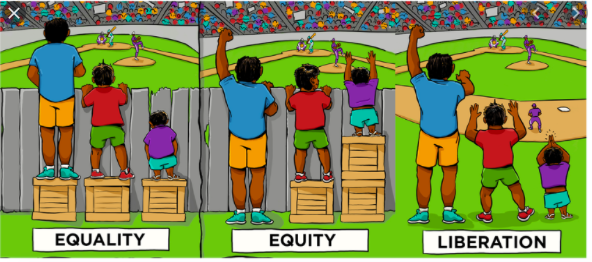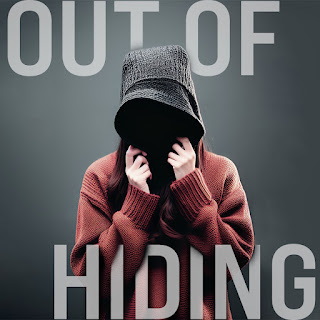The New Exodus

Perhaps you've seen this cartoon before. There's something very profound about it because as the saying goes, "A picture is worth a thousand words." I'll try to keep it to about 764 words, give or take. While we ponder just the words beneath each vignette, we may think to ourselves, those are all very good words and sound relatively the same. But when attached to the image we see how different and distinct they really are.
As a church who pursues the ministry of reconciliation within the body, we may be confronted with these words: equality, equity, and even, at times, liberation.
But let us first understand the nature of the work of God in and through Christ Jesus. We'll start with the story of the Exodus that takes place well before Jesus shows up on the scene. The Hebrew people find themselves enslaved in Egypt--a land that is foreign to them and beneath an empire that has harshly dehumanized them for, some say anywhere from 200-400+ years.
A man named Moses who was brought up in the system, sitting in the seat of the oppressor is removed from that environment for quite some time, finds the God they call YHWH, and recognizes who he (Moses) is and what he is called to do. He re-enters the Egyptian land where his Hebrew kin are still enslaved. His calling is to fix the problem. Now, let's use our examples from the cartoon to experiment a bit. I realize, if you are familiar with the story, these "experiments" may sound a bit ridiculous at first, but stick with me.
Through the lens of equality, Moses might go to the empire's tyrant Pharaoh and say, "You're treating them harshly. Will you please stop doing that? Allow me to give you a better solution. Give the Hebrew slaves Saturday and Sunday off and give them all a 9-5 workday." Equal!
Equity might encourage Moses to say to Pharaoh, "You're treating them harshly. Please stop and I'll give you a better solution. The elderly, and the women and children should not be expected to do the same labor as the young men. Please make those adjustments. Thank you." Equitable!
Again, you may find these examples somewhat laughable, especially if you know the story. So let us continue with the third option--liberation.
Liberation would compel Moses to demand, "Pharaoh, humans are not to be treated as property or machines. Let my people go!" Yeah, that sounds a little more familiar. Moses, on behalf of YHWH, introduces a radical concept in the ancient world that people have worth and purpose. And because of that truth, the systems of the ancient world don't simply need adjustments (i.e. equality or equity), but they need an entirely new paradigm shift. The systems need to be completely removed, torn down, burned down, destroyed, and made new. They need to "exit" what they know and start over--hence the name Exodus.
While well-intentioned, the people of God then spend a few centuries coming up with a new system to live into their new-found worth and purpose, but still come up short. It's not until another Hebrew comes along and blows up the system entirely. He uses radical statements like, "You have heard it said, but I tell you..." In other words, get rid of what you thought you knew and start over.
Needless to say, that upsets a lot of people and they find a way to kill him for it. Hmm, maybe he was wrong? But then, even in his death, we come to understand that he is actually liberating them from their centuries-long systems that needed a complete overhaul; and he actually mocks the system (i.e. death) altogether through his resurrection, so that all of humanity could truly live into their worth and purpose--a new Exodus. Did you catch that? He didn't stay dead! Jesus removed the system and created a new reality--resurrection life!
You'd think that'd be the end of the story, right? Yes and no. Liberation truly happened because of the work of Jesus. But not everyone chooses to participate in that work. The message became marred and distorted once again. All it takes is an honest look at American history to see that certain groups of people (i.e. people of color) have received the short end of the stick for literally hundreds of years. Along the way, some fought for equality and some even fought for equity; but it appears that the "system" keeps rearing its ugly head.
Now, the American church is faced with a unique responsibility. Will we seek equality or equity and make some slight or even big adjustments? Will that be enough? Or, will we follow in the footsteps of Moses and Jesus, the liberators, tear down the whole system and truly participate in the new Exodus?
Post a comment on how you're journeying through this conversation and learn more about an "honest history" by getting this book.
This content and other ministry is made possible because of the generosity of donors who give directly to LifeChurch Canton. If you'd like to continue to see more content and make an impact, partner with us through a generous gift or a recurring gift by going to our site. Thank you so much.



I am so happy to see that, finally, people of every color will worship together in the same place, where we belong, together.
ReplyDeleteWell written and in need of practical implementation in our churches, communities, and country at large— "let my people go"
ReplyDelete